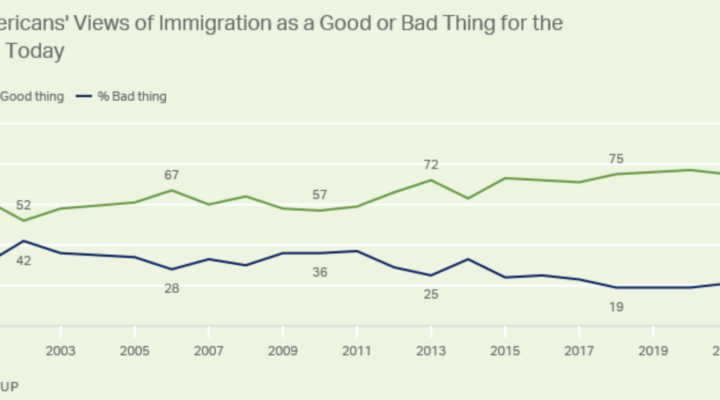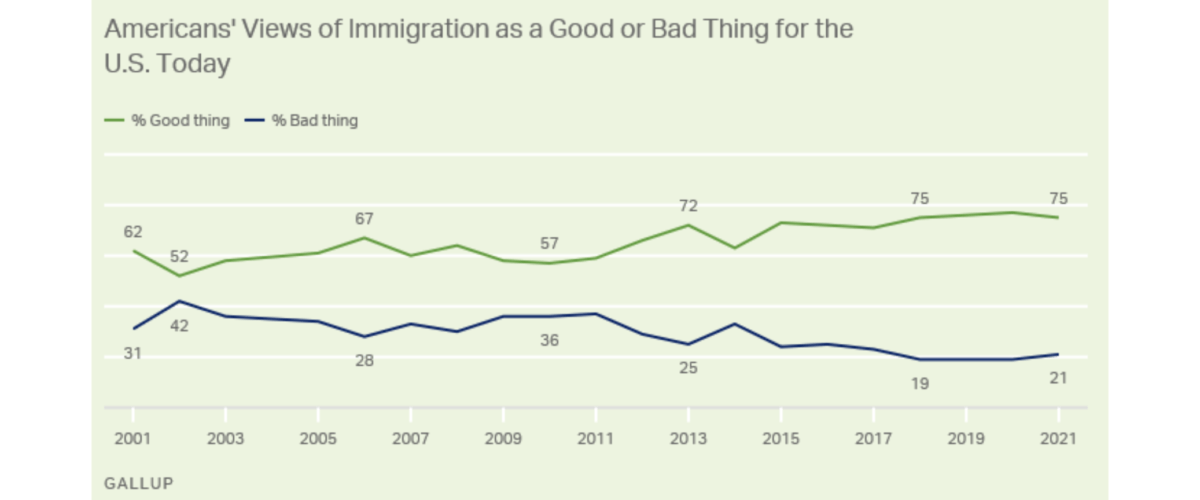A surge in U.S. southern border crossings and apprehensions in 2021 and heated debates about the continued expulsions of asylum seekers, the detention of unaccompanied child migrants and the fate of the DACA program have not dissuaded most Americans from holding positive opinions about immigration, according to a new Gallup survey released this month.
“Though Americans are divided on how immigration levels should change, they widely agree that immigration is ‘a good thing’ for the country today. Three in four U.S. adults hold this view, while 21% disagree and say it is ‘a bad thing,’” Gallup reported.
The June 1 to July 5 telephone poll of 1,381 American adults found 33% in favor of expanding immigration levels and 35% who say immigration should remain the same. Another 31% prefer that immigration levels be decreased.
“These preferences are similar to last year’s readings but reflect greater support for increased immigration since the early 2000s, reaching a high of 34% in 2020.”
“These preferences are similar to last year’s readings but reflect greater support for increased immigration since the early 2000s, reaching a high of 34% in 2020,” Gallup explained. “At the same time, there has been a decline in recent years in the percentage of Americans who want immigration decreased, with last year’s 28% the lowest in the trend.”
The survey, which also noted wider divisions on immigration levels by race and political affiliation, was released during a summer filled with immigration developments in the U.S., including a federal announcement of more than 1 million migrant apprehensions so far this year at the U.S.-Mexico border.
Secular and religious immigrant rights groups, meanwhile, have been pressing the Biden administration to stop using Title 42, a Trump-era federal health code addition enabling the U.S. to summarily expel asylum seekers while claiming COVID-19 concerns.
Further reports have surfaced that thousands of migrants, including unaccompanied youth, continue to be held in Immigration and Customs Enforcement facilities while a federal judge in Texas separately ordered the Deferred Action for Childhood Arrivals program, or DACA, to stop granting residency and work status to young immigrants raised in the U.S., sparking even more outrage from human rights organizations and condemnation from the White House.
Gallup acknowledged the connection between current events, as they relate to immigration, and the attitudes uncovered in its recent survey.
“These findings come at a time when the U.S. is struggling to control crossings at its southern border, with many of those migrants coming from Central American countries,” the organization said. “At the same time, many U.S. businesses are currently having difficulty filling open job positions. In the longer term, the U.S. has an increasingly aging population that may not be able to fill the number of jobs needed in the future.”
The upward trend in support for current or expanded immigration limits is not in keeping with Americans’ past attitudes, Gallup added.
“For much of Gallup’s trend dating back to 1965, the plurality (if not the majority) of Americans wanted immigration decreased,” the researchers noted. “Three surveys conducted between 1993 and 1995 found more than six in 10 wanting immigration reduced. After 9/11, 58% held this view, and as recently as 2009, 50% did.”
In fact, it was 2012 before more than 20% of respondents said they preferred increased immigration. “Since then, it has not gone below that level and has been the preferred option for one in three Americans each of the past two years.”
But disparities exist today along racial lines, with 42% of Hispanic adults preferring increased levels of immigration compared to 32% of Blacks and 30% of whites.
“Overall, white Americans divide equally in their preference for immigration, while Black Americans slightly prefer keeping immigration levels the same,” Gallup said.
All three ethnic groups have shown a greater openness to raising immigration levels since Gallup began tracking that metric in 2001. “That year, 10% of white Americans, 24% of Black Americans and 33% of Hispanic Americans favored increased immigration levels.”
The starkest differences today are found by political affiliation and educational levels.
The starkest differences today are found by political affiliation and educational levels.
“Fifty-seven percent of Republicans, compared with 12% of Democrats, want to see immigration reduced. In contrast, half of Democrats and 10% of Republicans want it increased,” Gallup reported. Among Independents, 34% prefer increased immigration while 36% want it held steady and 29% would like to see a decrease.
“Over the past decade, all major subgroups, with the exception of Republicans, have become significantly more inclined to see immigration as a good thing for the U.S. In 2011, 53% of Republicans viewed immigration positively, compared with 57% today. By contrast, the increases were 16 percentage points among independents (from 63% to 79%) and 23 points among Democrats (from 61% to 84%).”
Among Americans with post-graduate degrees, 50% prefer increasing immigration, 23% want the status quo and 27% want a decrease, Gallup said.
From there, a significant drop occurs, with 37% of college graduates preferring more immigration, 39% OK with current levels and 24% seeking a decrease.
Support for immigration increases dropped further to 31% and 25% among Americans with some college or high school or less education, respectively. Preference for less immigration in those groups stood at 31% and 35%, Gallup reported.
Gallup concluded that despite the overall favorable view Americans have toward immigration, it may not be enough to sway Congress to act decisively: “Americans’ views on immigration have held steady compared with what they were last year when Donald Trump, who took a much stricter stance against immigration, was in office.”
This means that calls to support measures such as the U.S. Citizenship and Dream and Promise acts, which provide reforms and direct paths to citizenship for many immigrants, may be a hard sell.
“Although there is general agreement among Americans that immigration is good for the country, their even division on whether immigration levels should be changed may be frustrating efforts to pass legislation,” Gallup concluded. “Moreover, Republicans and Democrats disagree about the proper level of immigration, as well as about the urgency of the problem, further hampering U.S. political leaders’ ability to find solutions to the issue.”
Related articles:
Coalition of evangelical Christians advocates third way on immigration reform
Pressure mounts on White House to rescind another Trump immigration policy


